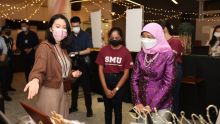
SMU has been awarded full re-accreditation for five years by the Association for the Accreditation of Human Research Protection Programs (AAHRPP), Inc. This is an achievement that reflects SMU’s commitment to conducting high quality, ethically conscious research and its reputation as an organisation that can be trusted to protect research participants and produce accurate, trustworthy scientific insights.
In 2018, SMU became the first university in Singapore to be certified by the AAHRPP, and also the first to be accredited by the AAHRPP as a research organisation. Notably, Peking University is the only other university-level approved organisation in Asia (that is not specifically associated with a medical-related research unit) to have received the same accolade.
“Attaining re-accreditation demonstrates AAHRPP’s strong vote of confidence in the high international standards and integrity of SMU’s research processes,” says Professor Archan Misra, SMU’s Vice Provost (Research).
“It also reaffirms that the SMU Institutional Review Board (IRB) continues to meet all the Accreditation Standards of AAHRPP and our commitment to continuously improving our Human Research Protection Programme to protect the safety, welfare and rights of the individuals who participate in our research, even as research projects evolve to increasingly embrace in-field experimental studies and use of AI technologies.”
The SMU IRB is an independent body, comprising scientific and non-scientific members, including members of the general public. It is established to ensure the protection of the rights, safety, and welfare of human research participants through reviewing and approving research conducted by SMU personnel.
In its report on the re-accreditation, the AAHRPP noted that SMU has a robust process that includes close coordination between the IRB and its Research Office. It ensures that all grants, contracts and other proposals submitted for funding are sent to and reviewed by the IRB to determine whether or not human participants are involved, and if so, whether the research protocols provide adequate safeguards for the safety and welfare of such participants. In addition, the professional support provided by the IRB to SMU community members conducting human participant research is also assessed. The IRB has evaluated and approved 1,389 studies during the previous three years.
Among the many aspects that impressed the review committee were SMU's processes and procedures for protecting the rights and welfare of research participants, as well as the care that senior management took to strike a balance between the need to enable cutting-edge research, as well as preserve academic freedom, and protecting participant rights and the university's reputation.
To maintain accreditation, an institution must continue to fulfil all of the Accreditation Standards established by the AAHRPP, such as the way in which it applies its human research protection programmes to all research regardless of funding source, type of research, or place of conduct of the research; and upholds arrangements ascertaining and enhancing the competence of researchers. In addition, they must ensure that they incorporate substantial protections at every level of their research operation and that they adhere to rigorous standards related to research integrity and ethics.
A non-profit accrediting body, the AAHRPP employs a voluntary, peer-driven educational methodology to guarantee that human resource planning programmes fulfil high requirements for quality and protection of human subjects. Organisations must offer actual proof – in the form of documented policies, processes, and practices – of their commitment to scientifically and ethically sound research, as well as to continual development of institutional processes, to be accredited.
Often regarded as an industry "gold seal," the certification attests to all parties involved in the research process, including study participants, researchers, sponsors, government regulators, and the general public, that an institution’s HRPP is robust and focused first and foremost on quality.
Since its inception, SMU has implemented processes and fostered a culture to protect research participants' safety, welfare, privacy, and rights. Examples of these include the establishment of additional safeguards to protect vulnerable populations in research, the regular evaluation of the SMU Institutional Review Board's composition and performance to ensure high-quality and multi-stakeholder reviews of human participant research, and the inclusion of oversight measures to ensure compliance with applicable laws and regulations.


